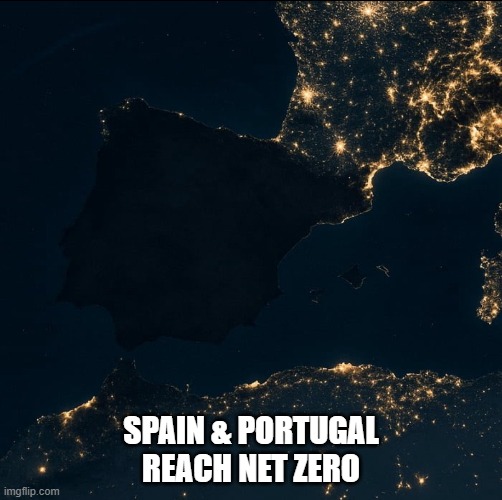We are developing the social individualist meta-context for the future. From the very serious to the extremely frivolous... lets see what is on the mind of the Samizdata people.
Samizdata, derived from Samizdat /n. - a system of clandestine publication of banned literature in the USSR [Russ.,= self-publishing house]
|
This is a real tweet from the European Commission:
https://x.com/EU_Commission/status/2004462313508950137f
One port, one cable, one Europe.
This holiday, unwrap the power of one: USB-C for all.
Yes, not just phones, tablets, and laptops. In three years, every charger will be under the same tree.
Because less waste, smarter choices, mean more for everyone, all year long.
https://link.europa.eu/QDMFTh
This is an excerpt from a scholarly article about the history of Islam:
By the beginning of the fourth century of the hijra (about A.D. 900), however, the point had been reached when scholars of all schools felt that all essential questions had been thoroughly discussed and finally settled, and a consensus gradually established itself to the effect that from that time onwards no one might be deemed to have the necessary qualifications for independent reasoning in law, and that all future activity would have to be confined to the explanation, application, and, at the most, interpretation of the doctrine as it had been laid down once and for all. This ‘closing of the door of ijtihad‘, as it was called, amounted to the demand for taklid, a term which had originally denoted the kind of reference to Companions of the Prophet that had been customary in the ancient schools of law, and which now came to mean the unquestioning acceptance of the doctrines of established schools and authorities.
– Joseph Schacht, quoted by Wael B. Hallaq in Was the Gate of Ijtihad Closed?
If you think that the ability of the European Commission to recognise when something has reached a point where no improvement is possible is good enough to allow it to safely close the door of ijtihad on charger cable design, consider the evident fact that none of the multiple people in the Berlaymont building over whose desks the draft of that tweet must have passed knew enough history to veto that title.
Just a reminder that no matter how bad things get, this too shall pass


It almost sticks in the throat if I try to say it out loud but, as a progressive internationalist mugged by reality, I have reluctantly come to the conclusion that the key ordering principle of the success of Poland, and the way forward for the whole of the West, is a healthy dose of inclusive, positive-sum, moderate, calm and confident nationalism. Modern, first world, constructive patriotism. Not so much blood and soil as free-thinking European civilisation and open society, but, importantly, strict on those who refuse to contribute to its maintenance. Some call it muscular liberalism.
I am at pains here to draw a sharp contrast between the Polish version of temperate (some call it conservative) nationalism, and Hungary’s pro-Russia and pro-China variant. I also hasten to confirm up high in the article that I am not a sycophant of Poland in any way, and I have not taken any payment or gift from Polish interests. On the contrary, the government officials and ex officials I approached for comment were slightly disturbed by my open admiration and suggestion that Poland should be a leader of Europe in a way that Great Britain and France once were. Indeed, they rushed to point out that Poland, despite doing everything right and getting the best results, is routinely excluded from strategic meetings deciding the future of the continent, usually held between the UK, Germany, France and Italy. They were, alas, too polite to speculate about the reasons for this exclusion.
– Matei Rosca
DR, Denmark’s equivalent of the BBC, reports that:
The Danish presidency of the EU is currently working to gain support for the CSA regulation, which will open a backdoor to all Europeans’ phones in an attempt to trap and track down criminals who share sexual abuse material with children.
If the CSA regulation is voted through, police and judicial authorities will be able to access encrypted communication services such as WhatsApp and Signal – and thus the private communications of many millions of Europeans.
A leaked document from the European Council states that this will be done through client-side scanning . The technology works by scanning images, video and text on the user’s device before sending and encrypting them, including with the help of AI.
[…]
The CSA regulation was taken off the agenda of the EU Council of Ministers in June 2024 due to the risk of mass surveillance of EU citizens and a concern that the law could represent a setback for freedoms.
But two months later, the Minister of Justice [Peter Hummelgaard] stated to TV 2 that “we need to break with the completely erroneous perception that it is every man’s right to freedom to communicate on encrypted messaging services, which are used to facilitate many different serious forms of crime”.
The UK’s recent seemingly modest agreement with France over illegal migrants crossing the English Channel prompted this article at the CityAM news service:
Clearly this is an entirely inadequate response to the Channel crisis: five per cent of current numbers of illegal migrants, who are themselves only five per cent of overall immigration. The idea that this will move the dial on an issue which is now regularly cited as one of the public’s biggest concerns is positively outlandish.
But it is also a patently and laughably poor deal for Britain. It bears comparison with paying Mauritius billions of pounds to induce it to accept sovereignty of the British Indian Ocean Territory, or in domestic terms awarding huge, above-inflation public sector pay deals with no conditions attached. I sometimes wonder whether civil servants now check that the Prime Minister still has his loose change, watch and shoelaces when he returns from the negotiating table.
I suppose the question that also lingers about Keir Starmer is this: is he “Sir Shifty” (to borrow the phrase of former Sun political editor, Trevor Kavanagh) or is he “Sir Stumbler” (Bruce Anderson)? Is he a berk or a knave?
(Correction: It is Trevor Kavanagh, not Patrick. My berk moment.)
Farage wants healthcare more like France, Netherlands or Switzerland, which all have a varying degree of insurance element. NHS was always a terrible way to do healthcare, which is why rest of Europe didn’t copy it
So, is it not ironic Reform party are open to at least exploring that kind of system, whereas the supposedly pro-European anti-Brexiteer elements who most depreciate Farage get the vapours at the notion of a more European healthcare system for the UK? 🤣
The Guardian, 6th December 2024: Romanian court annuls first round of presidential election
The Guardian, 9th March 2025: Pro-Russia Călin Georgescu barred from Romanian presidential election re-run
The Guardian, 15th May 2025: Romania might be about to make a Trump-admiring former football hooligan its president. This is why
Georgescu sounds a nasty piece of work, and Simion not much better, but the “election interference” that might truly kill off Romanians’ faith in democracy is not coming from them.
Renewables don’t risk blackouts, said the media. But they did and they do. The physics are simple. And now, as blackouts in Spain strand people in elevators, jam traffic, and ground flights, it’s clear that too little “inertia” due to excess solar resulted in system collapse.
– Michael Shellenberger
Also… here.

Credit to the Guardian for discharging their duty to report this story:
Couple who ran Swedish eco-retreat fled leaving behind barrels of human waste
A Danish chef couple who attracted international acclaim with a “forest resort” in Sweden have been tracked down to Guatemala after apparently going on the run from tax authorities, leaving behind 158 barrels of human waste.
Flemming Hansen and Mette Helbæk founded their purportedly eco-friendly retreat, Stedsans, in Halland, southern Sweden, after claiming to have “felt the call of the wild” in Copenhagen, where they ran a popular rooftop restaurant.
Stedsans, formed of 16 wooden cottages looking out on to nature, attracted praise from influencers and reviewers, who described it as “magical” and “enchanting luxury”.
But a few months ago it was discovered that the couple had vanished, leaving multiple animals behind and 158 barrels of human waste, an investigation by newspapers Dagens Nyheter and Politiken has found.
Officers of the Swedish Police have made an announcement regarding the 30 or so bombings in the country in January 2025, attributed to extortion of businesses by criminal gangs, and have said that they can’t cope and they need all of society to mobilise to help them. However, they don’t appear to say how this should be done, or what with, so there might be some misinterpretation and I don’t think that the posse is a thing in Sweden, reported by the independent, reader-funded Nordic Times.
Swedish Police: “Everyone must take responsibility for the bombings”
This puts me in mind of a character in The Daily Telegraph’s Peter Simple column, who, as a fore-runner of today’s DEI activists would roundly proclaim ‘We are all guilty!’, a chilling vision of the climate today.
However, coming back to Sweden, we are told:
– The whole society must be mobilized. Everyone must take responsibility and do even more, said Tobias Bergkvist, deputy regional police chief for Stockholm.
During a press conference on Wednesday, the police emphasized the urgency of the situation and the need to take action to stop the wave of violence.
– We have a very serious situation, not only in Stockholm but also nationally, Bergkvist emphasized.
The Nordic Times has its own take on the matter, citing, as the BBC would probably point out, ‘without evidence’ networks of immigrant criminals.
The police do not seem to have gone that far in terms of specificity:
– What we are seeing now is an escalation of violence, but also a change in the problem. The majority of the bombings we have suffered in December and January have rather financial incentives, are strategic acts targeting companies and often for extortion purposes, says Hampus Nygårds, Deputy Head of the National Operations Unit (NOA).
“Criminal ecosystem”
He explains that the purpose of the attacks is to intimidate business owners into paying to stop the threat.
– Money is demanded to stop the violence and threats.
The police describe how a “criminal ecosystem” has emerged, where the recruitment of new perpetrators has now moved to digital platforms. Young people are offered money to commit acts of violence – including murder.
But there is a plan, nothing so far like what appears to be happening in the USA, this is Sweden after all, but the plan is an increased digital presence of the police.
The police are now mobilizing, especially in Stockholm but also nationally. We are taking measures such as reinforcements from different police regions, Bergkvist explains.
An important part of the strategy is said to be to increase the police’s digital presence and competence and to focus more on identifying and stopping bomb makers before the explosions are carried out, but the police believe that crime prevention work cannot be done by the authorities alone.
Sometimes the Guardian shows flashes of its old persona as a guardian of liberty. Publishing this article by Apostolis Fotiadis was one example:
The EU wants to scan every message sent in Europe. Will that really make us safer?
In my 20 years of being a reporter, I have rarely come across anything that feels so important – and yet so widely unnoticed. I’ve been following the attempt to create a Europe-wide apparatus that could lead to mass surveillance. The idea is for every digital platform – from Facebook to Signal, Snapchat and WhatsApp, to cloud and online gaming websites – to scan users’ communications.
This involves the use of technology that will essentially render the idea of encryption meaningless. The stated reason is to detect and report the sharing of child sexual abuse material (CSAM) on digital platforms and in their users’ private chats. But the implications for our privacy and security are staggering.
Since 2022, EU policymakers have attempted to push the legislation, called the regulation to prevent and combat child sexual abuse (better known as the CSAM regulation proposal), through. Similar attempts to introduce the tech in Britain via the online safety bill were abandoned at the 11th hour, with the UK government admitting it is not possible to scan users’ messages in this way without compromising their privacy.
Cybersecurity experts have already made their opinions clear. Rolling out the technology will introduce flaws that could undermine digital security. Researchers based at Imperial College London have shown systems that scan images en masse could be quietly tweaked to perform facial recognition on user devices without the user’s knowledge. They have warned there are probably more vulnerabilities in such technologies that have yet to be identified.
The title of this post referred to this story: “Britain’s biggest choir ditches Every Breath You Take over ‘abusive’ lyrics”
The song, which was written by Sting and released in 1983, is considered by some to be a stalkers’ anthem.
Sting has admitted that the words – “Every breath you take/ And every move you make/ Every bond you break/ Every step you take/ I’ll be watching you” – have “sinister” overtones.
Just not in the way the Guardian thinks.
The Guardian view on Romania’s annulled election: a wake-up call for democracies
The unprecedented move by the country’s constitutional court last week to annul the results of the first round of the presidential election, amid allegations of Russian interference, is a landmark moment in the increasingly embattled arena of eastern European politics. The decision followed an astonishing surge to first place by a far-right admirer of Vladimir Putin, who had been polling in low single digits until the eve of the election. According to declassified intelligence reports, Călin Georgescu benefited from a vote that was manipulated by various illicit means, including cyber-attacks and a Russian-funded TikTok campaign. Analysts found that about 25,000 pro-Georgescu TikTok accounts became active only two weeks before the first-round vote.
What form did the “manipulation of the vote” by these cyber-attacks take? One would think the Guardian’s leader-writer would be clearer on this point. If it was something like changing the tallies on voting machines (I do not know if Romania even has voting machines), that absolutely would be illicit manipulation of the vote. No doubt Vladimir Putin would be delighted to literally falsify the numbers of votes cast for candidates in the Romanian election if he could, but did he? Give us evidence, or I am going to assume that these alleged cyber-attacks are of a piece with the 25,000 fake TikTok accounts – that is, not attacks at all, just the issuance of propaganda. As I have frequently said, Vladimir Putin belongs at the end of a rope. But that is because he is a mass-murderer, not because he gets a bunch of drudges and bots to say words on the internet.
When I was a kid, I used to turn the dial of our family’s radio to “Moscow” quite often. Radio Moscow wasn’t as good – by which I mean it wasn’t as bad – as Radio Tirana, whose announcer would say “Good night, dear listeners” in a strange voice eerily reminiscent of the evil Dr Crow in Carry On Spying, who I have just found out after half a century was not played by Hattie Jacques but by Judith Furse, only voiced by John Bluthal in order to sound more asexual. (The character is meant to be the forerunner of a race of artificially created superior beings who have gone beyond being male or female.) Neither the supervillainesque lady in Albania or the main Russian presenter, whose English accent was eerily good, had much luck in turning me communist. But I always thought that one of the things that made the UK a democracy was that I was perfectly free to turn the dial to Tirana or Moscow and let them try.
|
Who Are We? The Samizdata people are a bunch of sinister and heavily armed globalist illuminati who seek to infect the entire world with the values of personal liberty and several property. Amongst our many crimes is a sense of humour and the intermittent use of British spelling.
We are also a varied group made up of social individualists, classical liberals, whigs, libertarians, extropians, futurists, ‘Porcupines’, Karl Popper fetishists, recovering neo-conservatives, crazed Ayn Rand worshipers, over-caffeinated Virginia Postrel devotees, witty Frédéric Bastiat wannabes, cypherpunks, minarchists, kritarchists and wild-eyed anarcho-capitalists from Britain, North America, Australia and Europe.
|






